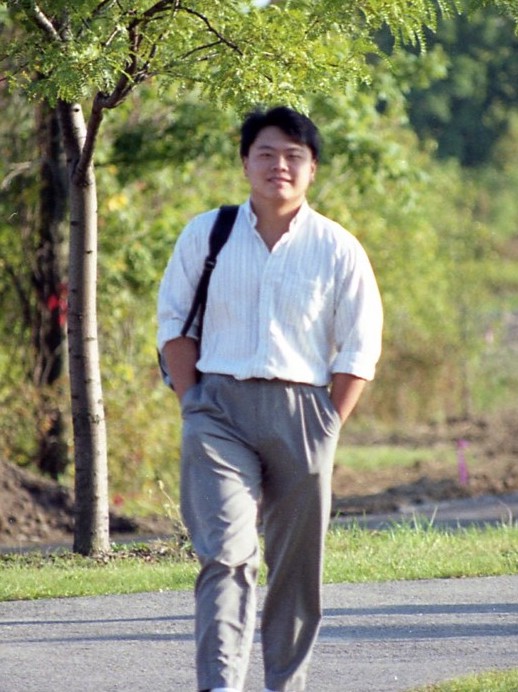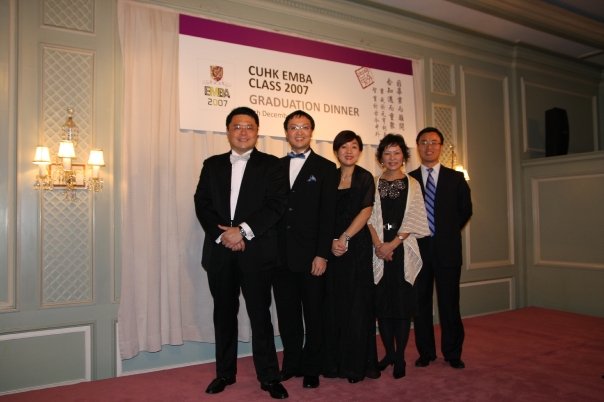Leading Hong Kong's New Industrialization with I&T
Sunny Chai abides by commitment and stays involved
Chairman of Hong Kong Science and Technology Parks Corporation (HKSTP) Dr. Sunny Chai (07/GS/EMBA) values commitment, whether it is one to taking over his family factory, serving in public office or contributing towards society. He always follows through with his promises and wholeheartedly devotes himself to fulfilling them. Whether it is studying, working or pursuing personal interests, he believes it is essential to approach them seriously and with total dedication in order to have a chance of success.

Sunny's passion for innovation and technology (I&T) has long preceded his appointment as Chairman of HKSTP. In fact, his interest in this field began when he was in Primary Six. "I remember asking my mother to let me attend a summer computer class. It was in the 1970s and the classroom housed a Commodore 64 computer where I learned BASIC programming. When I progressed to the second year of secondary school, my father purchased an Apple II computer clone for me. However, at that time, computer classes were not yet available in local schools. It was only when I went to the US for education that I saw computer labs and instructors teaching Pascal programming language. I was excited to embark on a programming journey."
As the youngest in his family, he followed in the footsteps of his older siblings, who were studying in the US. "Due to my deep passion for computers, my original intention was to pursue a degree in computer science or product design. However, upon talking with my family members, I ultimately decided on business administration. Nevertheless, I selected several computer-related subjects during my time at university."
Driven by a personal interest in computers, Sunny looked forward to more practical experience with them. "Fortunately, my university had a requirement for all students to work off-campus for two semesters. I decided to work in the computer department of a garment factory in San Po Kong, which employed around 3,000 people. During my time there, I learned how to write dBase III programs. In addition, I noticed the significant differences between the factory I worked in and the one operated by my parents. This observation got me thinking about which aspects of the business should be prioritized for reform when I eventually return to assist in the family factory."
In fact, when he went to study in the US, he had promised to return to Hong Kong and take over his father's business. "From a young age, I have never failed to honour the commitments I made. While my older sister and brother chose to remain in the US, I reassured my parents that I would return to Hong Kong. I remember, during my second year of studies, my father once again asked me if I was really coming back. It was revealed that he had thought about relocating the factory to Shenzhen, but he wouldn't proceed with the idea if I chose to stay in the US after graduation. As my father grew older, managing both the Hong Kong and Shenzhen operations would become increasingly challenging for him. Since I had made the promise to him, I felt obligated to uphold it."

CUHK Alumnus Sunny Chai (first left), in the capacities of Chairman of the Federation of Hong Kong Industries and Hong Kong Science and Technology Parks, travelled to Abu Dhabi with Chief Executive of Hong Kong Mr. John Lee, to sign a memorandum of understanding for cooperation with a local chamber of commerce
"King of Scales"
After graduating in 1988 from the Rochester Institute of Technology, he joined the Fook Tin Group in Hong Kong, a company founded entirely by his father, and introduced computer management practices. He recalls, "Initially, my parents were hesitant about embracing this new approach. I could only phase out the typewriters and transition to computer-generated templates for clerical work. However, as they witnessed the benefits of computers, their perception changed. I proceeded to develop a scaled-down version of an Enterprise Resource Planning (ERP) system, gradually automating processes such as procurement, inventory, and sales. I also enhanced the company's internal communication system. Since Internet connectivity was not available back then, I promptly implemented a NetWare system within a year, enabling staff to communicate via cc:mail within the company's intranet."
After the introduction of computerized company management, the next endeavour was to streamline the company's product line. Sunny explains, "My father's strengths lay in manufacturing machinery and moulds. In the past, he primarily engaged in business with foreign companies, producing items like flashlights, vacuum cleaners, lamps and razors. Interestingly, in 1975, he designed a mechanical scale with a more intricate structure than traditional needle-based scales. Recognizing the high level of technical complexity involved, he switched his business focus to developing and manufacturing mechanical scales. This strategic shift proved fruitful, attracting numerous European customers." By refocusing the business on scales, the company gradually emerged as a leading global scale manufacturer, and Sunny earned the reputation of being the "King of Scales".

Sunny studied at the Rochester Institute of Technology in the US, where he obtained a bachelor's degree in science.
Lifelong learner holding a CUHK EMBA master's degree
Having promised to take over the family factory, Sunny dedicated himself for over a decade to the business. However, he never forgot about his pursuit of further education. "After returning to Hong Kong upon completing my university studies, my desire to enrol in an MBA programme recurred almost every year. I even began researching various MBA courses and purchased books for the GMAT exam. Unfortunately, I never had the time to carry it through. For over a decade, I tirelessly worked for the company, overseeing numerous acquisitions, mergers, and restructuring of factory operations. As our business gradually stabilized, I finally found the time for an EMBA programme. When comparing different EMBA courses, I discovered that CUHK had an advantage over others in various aspects. That was the reason I chose CUHK."
He said that his experience of studying EMBA at the University was filled with unforgettable moments, the most memorable of which was his first exam. "The subject was taught by Prof. Michael Ferguson. It had been over a decade since I last took an exam. As I held my pen, my hand kept trembling for the first five minutes of the exam. Observing my blank answer sheet, the professor understood my anxiety and smiled, reassuringly saying, 'You are doing good.' That helped ease my tension, and from that point on, I gradually became more comfortable with taking exams."

Graduating from CUHK's EMBA programme, Sunny (first left) is pictured with his classmates at the graduation dinner.
Devotee to public service
Speaking of his devotion to public service, Sunny said the turning point was when he received the Young Industrialist Award in 2004. "During the evaluation process, some judges remarked that while I showcased competence in my business ventures, my involvement in public service was totally lacking. As I carefully studied the resumes of other awardees, I realized that they held multiple public positions and made significant contributions to society. In response, I made a commitment to the judges that if I were to receive the award, I would definitely spend more time on public service."
Sunny garnered the Young Industrialist Award on his inaugural participation, immediately after which he joined a chamber of commerce. Within a year, he received an invitation from Mr. Anthony Wong, the former Commissioner for Innovation and Technology, to join the Hong Kong Applied Science and Technology Research Institute (ASTRI). "Initially, I had concerns about my suitability, as the ASTRI Board of Directors comprised university vice-presidents and industry veterans. During the board meeting I first attended, someone even questioned Chairman Allan Wong if I was an intern, who swiftly clarified the matter. From then on, my passion for public service was ignited. I subsequently embarked on a journey with various organizations, including the Innovation and Technology Commission, the Logistics and Supply Chain MultiTech R&D Centre, HKSTP and the Federation of Hong Kong Industries."
Juggling numerous public roles, he recognized the importance of time management. Expressing his passion for sailing, he shared, "There was a period when I instructed my secretary to schedule all my meetings within a span of three to four days, allowing me to enjoy my pastime. I aimed to dedicate one or two days every week to sailing. However, as my commitments grew and social obligations increased, I had to move my hobby time to weekends or limit my involvement in it as necessary. I couldn't participate in every competition and would ask my teammates to stand in. Ultimately, it is most important to coordinate with my family."

Sunny (first right), a passionate fan of sailing, has few opportunities to enjoy his hobby recently.
Brains behind INNOPARK
Appointed Chairman of HKSTP by the government in 2018, Sunny reflects on his aspiration to nurture 500 start-ups within HKSTP in a span of five years. Remarkably, this goal was accomplished in under three years. "Colleagues jokingly suggested I could retire at that point, but I got another objective: the revitalization and transformation of Industrial Estates. Given the strong connection between HKSTP and Industrial Estates, now known as INNOPARK, it was evident that their collaboration would enhance Hong Kong's new phase of industrialization. Having my own ideas, I invited local industrialists to join our advisory committee in 2020 for thorough discussions. After two rounds of feedback collection, we successfully finalized the plan to reshape Industrial Estates."
The plan entails the returned factories by businesses relocated from Industrial Estates, with the aim of transforming these facilities to meet the standards of other industries. New centres such as the Advanced Manufacturing Centre (AMC) and the Data Technology Hub (DT Hub), which were established last year in the Tseung Kwan O Industrial Estate, as well as the upcoming completion of the Microelectronics Centre (MEC) next year, will also contribute to this transformation. "INNOPARK will provide a wider range of industrial buildings in the future. However, these developments cannot be achieved overnight. I understand this as an industrialist myself. While not all members of the HKSTP Board of Directors have backgrounds in the industrial sector, we all share a keen interest in understanding and actively participating in the industry's upgrade and transformation."

This May, CUHK awarded Honorary Fellowship to Sunny (first right), recognizing his outstanding achievements in his career and significant contributions to the university.
When discussing the development of local I&T, Sunny believes that the current period is the most opportune. He elaborates, "In recent years, the government has unprecedentedly allocated over HK$150 billion in fostering I&T. Today, young researchers in universities only need to have a project idea before applying for the Technology Start-up Support Scheme for Universities (TSSSU) to obtain funding, or they can seek financial assistance from the HKSTP IDEATION Programme. These opportunities provide funding of about HK$80,000 to HK$100,000, allowing them to test the viability of their innovative ideas. If their trials yield positive results and they have a genuine desire to establish a company, they can apply for incubation programmes that offer support amounting to several million dollars. Those who demonstrate excellence will continue to receive support at different stages through various programmes."
He advises young individuals aspiring to enter I&T to wholeheartedly dedicate themselves. "To pursue I&T, one must possess the right mindset and be receptive to the opinions of others. Even in the face of setbacks, it is important not to lose heart. Instead, make necessary adjustments. Even the founders of Lalamove, a unicorn start-up from our alumni, encountered various challenges. There are no stories of smooth sailing and easy success in this world. Entrepreneurship has its ups and downs, but, with determination, success will eventually come."

Sunny believes that now is the best time for the development of innovation and technology in Hong Kong.
Sunny Chai's Profile
- 1988‧Graduated with Bachelor of Science from Rochester Institute of Technology (USA)
- 2004‧Received Young Industrialist Award of Hong Kong
- 2006‧Board of Directors, Hong Kong Applied Science and Technology Research Institute
- 2007‧Graduated from EMBA at CUHK
- 2010‧Awarded Doctor of Engineering (EngD) from CityU
- 2013‧Board of Directors, Logistics and Supply Chain MultiTech R&D Centre Limited
- 2018‧Chairman, Hong Kong Science and Technology Parks Corporation
- 2021‧Chairman, Federation of Hong Kong Industries
"CU Alumni Magazine" Video Interview: https://youtu.be/EF-uW9zk1Us (Chinese only)
Published on "CU Alumni Magazine" Issue 114 by Alumni Affairs Office 2023
Read online: CU Alumni Magazine Issue No. 114 (Chinese Version Only)
pdf version: http://alumni.cuhk.edu.hk/en/magazine/categories/pdfversion/202306
ISSUU version: http://www.alumni.cuhk.edu.hk/magazine/issuu/





